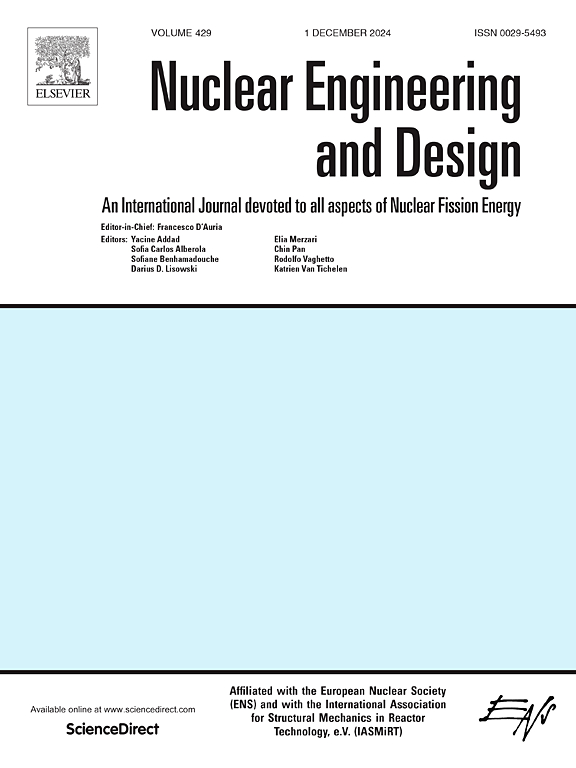Development of an on-line structural integrity assessment system for the primary loop pipeline in NPPs
IF 1.9
3区 工程技术
Q1 NUCLEAR SCIENCE & TECHNOLOGY
引用次数: 0
Abstract
A comprehensive online structural integrity assessment (SIA) methodology that fully accounts for the actual aging conditions and real-time transient operating parameters of primary loop pipelines in nuclear power plants remains absent in the existing literature. This paper proposes a novel online SIA approach based on thermoelectric potential (TEP) and failure assessment diagram (FAD) technologies. Initially, the online SIA process is established, and a conversion method between TEP values and impact energy is explored. The findings demonstrate that the Seebeck coefficient is highly sensitive to microstructural changes in the material, and the variation trend of TEP values closely aligns with that of impact energy. Subsequently, a systematic conversion methodology for TEP values and fracture toughness is presented. The FAD for primary loop pipelines is developed and analyzed. Sensitivity analysis of the safety margin reveals that enhancing the flow stress strength of the material or reducing the structural load is an effective strategy for improving the safety margin of the primary loop pipeline. Finally, an online SIA software, which has been successfully applied in the assessment of a nuclear power plant, is introduced. The SIA-based results confirm that the pipeline remains safe during the actual startup process.
求助全文
约1分钟内获得全文
求助全文
来源期刊

Nuclear Engineering and Design
工程技术-核科学技术
CiteScore
3.40
自引率
11.80%
发文量
377
审稿时长
5 months
期刊介绍:
Nuclear Engineering and Design covers the wide range of disciplines involved in the engineering, design, safety and construction of nuclear fission reactors. The Editors welcome papers both on applied and innovative aspects and developments in nuclear science and technology.
Fundamentals of Reactor Design include:
• Thermal-Hydraulics and Core Physics
• Safety Analysis, Risk Assessment (PSA)
• Structural and Mechanical Engineering
• Materials Science
• Fuel Behavior and Design
• Structural Plant Design
• Engineering of Reactor Components
• Experiments
Aspects beyond fundamentals of Reactor Design covered:
• Accident Mitigation Measures
• Reactor Control Systems
• Licensing Issues
• Safeguard Engineering
• Economy of Plants
• Reprocessing / Waste Disposal
• Applications of Nuclear Energy
• Maintenance
• Decommissioning
Papers on new reactor ideas and developments (Generation IV reactors) such as inherently safe modular HTRs, High Performance LWRs/HWRs and LMFBs/GFR will be considered; Actinide Burners, Accelerator Driven Systems, Energy Amplifiers and other special designs of power and research reactors and their applications are also encouraged.
 求助内容:
求助内容: 应助结果提醒方式:
应助结果提醒方式:


